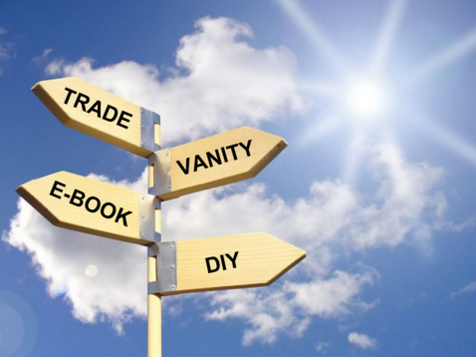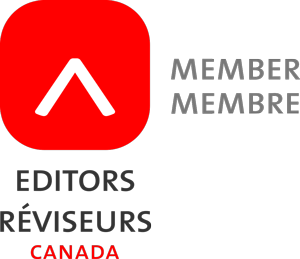Self-publishing or traditional publishing?
Which is right for you?
The decision to self-publish or to find an agent and a traditional publisher is a highly individual one, and it’s sometimes a difficult one. Although I’m an advocate of self-publishing, I realize it’s not the path for every author, and I fully support all my authors’ decisions, whatever they may be. Your path to publication will be as unique as you are.
Traditional publishing
Many authors decide they want to go the traditional route, submitting queries to agents, hoping an agent will accept them, and then hoping the agent finds them a publisher. You may feel there is a certain cachet in being published by a trade publisher. You may like the idea of getting an advance and royalties from a publishing house. You may be the kind of person who isn’t bothered by rejection or the idea of sending hundreds of query letters and waiting, sometimes months, for a response. Perhaps self-publishing seems too costly up front. Or perhaps you don’t like the “self” in self-publishing—you feel overwhelmed by the thought of doing all that publishing work, well, yourself. Then the traditional publishing route is for you.
Note: If you choose this route, in today’s competitive book world, your publisher will still expect you to do most of your own marketing. And increasingly, agents today expect you to have worked with a professional editor before you submit; as well, they may want a marketing platform outlined and included along with your submission.
Publishing services companies
Many so-called self-publishing companies exist—for example, you may have heard of iUniverse, Trafford, Xlibris, or AuthorHouse (all subsidiaries of Author Solutions Inc.)—but these are actually publishing services companies or subsidy publishers or fee-based publishers. The “self-publishing” descriptor is not accurate. They will charge you for a package—an array of services such as a stock cover, basic typesetting, minimal editing, and printing or e-formatting. Usually, you’ll have to buy your own books back, you’ll be paid minimal royalties, and they will do very little to market your book. Some of them retain the rights to your book—a scary prospect if you become successful. This often amounts to little more than a new, disguised model for vanity publishing. Though many are legitimate, please beware of these publishing services companies. Often, you pay them a lot up front, but instead of personalized attention to detail, you get an inferior product. Ultimately, they make their profits at your expense—not from promoting and selling your book, but from what they charge you and thousands of other authors for their services. Research extensively before buying the services of a subsidy publisher, or contact me and I’ll be happy to give you some guidance.
Self-publishing
Increasingly, authors are choosing the do-it-yourself approach. The best self-publishers are natural entrepreneurs—I call them book entrepreneurs. If you’re truly self-publishing, as I mentioned, you are the publisher, the employer, and that means you’ll need to hire and coordinate an editor, designer, printer, distributor, book marketer, and any other “staff” you may need to get your book out there. You’ll need to learn all about the publishing business, just as you would to be successful in any business, including handling budget, finances, and taxes. You’ll be responsible for 100% of your marketing, and the success of your book will entirely depend on you. You’ll also receive 100% of the profits after your expenses, and you’ll be in complete charge of the editorial, design, and production process. Do you want creative control over your final product? Do you relish the idea of receiving all profits? Are you willing to be fully responsible for the success of your book? Then self-publishing may be for you.
Authors choose to self-publish their books for many different reasons. But self-publishing authors all have one goal in common: to get their book out into the world. Here are ten good reasons to consider self-publishing, adapted from my colleague, book designer Fiona Raven:
Traditional publishers take too long
We’ve all heard about authors who received rejections from publishers for years before finally getting a book published. And we know that publishing houses receive thousands of manuscripts a year and may only choose a dozen or so. This may prompt you to consider self-publishing, as your book could be ready for market within three to four months. (Read more here about the editorial process.)
Keeping your profits
Traditional publishers and many publishing services companies pay royalties, which are often minimal. The initial cost is higher for self-publishing, but if your book sells well, you’ll make your money back because you’ll keep 100% of your profits after expenses.
Testing the market
Supposing you’ve just written your first book. Will it sell? Will it be successful? Many first-time authors choose to self-publish using print-on-demand (POD). You can start with twenty books or two hundred books and test your market. And sometimes self-published books get picked up by publishers.
A limited market
Your book may appeal to a limited market (Intricacies of Microscopic Widgets) and therefore not be of interest to a large publishing house. However, your book may be very successful within your specific market. In this case, short-run printing or POD may be perfect for you.
Time-sensitive books
Some books are time-sensitive—political, ecological, medical—and for whatever reason, need to be out there now while the buzz is happening.
Helping your career
By self-publishing a book related to your field of work, you become an authority within your area of expertise. This can lead to other career opportunities. Perhaps your book is about a product or service, which can lead to new sales opportunities.
Course materials
Publish your course materials. They’ll look professional, and you can include them in the cost of your course and sell them to the public.
Helping others
Sometimes authors whose books are about health issues or spiritual or personal growth will choose to self-publish so their books will be available to help others. They feel that with each book read, someone is receiving a benefit, and their book is serving its purpose no matter how many or few are sold.
Leave a legacy
Every human being has a unique story to tell, rich with both unusual and ordinary events as well as moments of glory, tragedy, and comedy. Your personal history is as individual as you are, and it can be an invaluable source of family memories to pass along to your close relatives, friends, and descendants. A short-run printing of your memoirs will become a cherished family heirloom.
Your book—the way you want it
Some authors decide to self-publish so they can be involved in the entire creative process and have their book turn out exactly as they choose. Self-publishing authors have final say in all decisions about editing, proofreading, title, cover design, interior page design, marketing and, ultimately, of their book’s entire publication schedule.
Whatever your reasons for deciding on traditional publishing or self-publishing, make sure you enjoy the process by seeking out professionals to work with who share your vision for your book. See my blog post of March 13, 2014, for many more reasons in favour of self-publishing.


